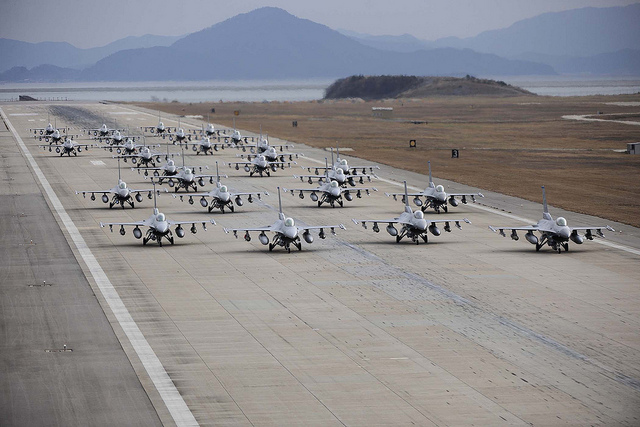Hill Likely to OK $8B F-16V Sale To Taiwan; DoD Mulls Where To Train
Posted on

F-16s demonstrate an elephant walk at Kunsan Air Base, South Korea,
PENTAGON: The State Department sent Congress informal notification today that it intends to sell 66 F-16V fighters to Taiwan for $8 billion, marking another major deal with the independent island just weeks after agreeing to sell 108 M1A2T Abrams tanks and missiles worth $2 billion.
The proposed deal, which is not expected to face serious opposition in Congress, would be one of the largest and most significant between the US and Taiwan in recent memory. The dozens of 4th generation F-16V fighters would represent a major upgrade from Taiwan’s existing fleet of about 140 F-16A/B planes, which join a mix of 90s-era French Mirage 2000 and locally made F-CK-1 Ching-kuo fighters.
China rejected the effort as soon as word leaked on Friday, claiming US arms sales to Taiwan violate the one-China principle. The sale represents “interference in China’s internal affairs,” Foreign Ministry Spokesperson Hua Chunying told reporters, calling on the US to “refrain from selling F-16V fighter jets to Taiwan and stop arms sales to, and military contact with, Taiwan. Otherwise, the Chinese side will surely make strong reactions, and the US will have to bear all the consequences.”
Taiwan has long coveted the upgrade, but a previous request for 66 new F-16s was rejected by the Obama administration. With China continuing its rapid military modernization efforts however, the Trump administration and Taipei continued the F-16 talks for months even as some thought the administration would hesitate to move forward while it was involved in sensitive trade negotiations with Beijing. But President Trump and Secretary of State Mike Pompeo were eager to move the package up to the Hill.
Now that the House Foreign Affairs and Senate Foreign Relations Committees have the paperwork for review and approval, they have 30 days to approve or reject the package. That review timeframe can be shorter if lawmakers want to move more quickly, something that is possible given the support for arms deals with Taiwan on the Hill.
House Foreign Affairs Committee chairman Eliot Engel ranking member Michael McCaul said in a joint statement the sale “sends a strong message about the U.S. commitment to security and democracy in the Indo-Pacific” and helps “deter China as they threaten our strategic partner Taiwan and its democratic system of government.” The two added they expect the deal to go through with broad bipartisan support.
In a statement released today, Sen. Ted Cruz gave full-throated approval to the deal: “With China building up its military to threaten us and our allies — and the People’s Liberation Army aiming thousands of missiles at Taiwan and deploying fighter aircraft along the Taiwan Strait — now more than ever it is critical that Taiwan has the support needed to defend itself.”
Eric Sayers, former special assistant at INDO-PACOM and SASC Pacific staffer, said the Trump administration deserves credit “for moving forward and ignoring the classic ‘China calendar’ problem where the US-Taiwan relationship is held hostage by important events in the US-China relationship.” After the Abrams and Stinger missile sales to Taiwan in July, the proposed F-16V package is “more evidence they are successfully returning to a normalized process where sales are considered individually instead of packaged into large bundles and delayed for years.”
On Thursday, America’s top representative in Taiwan, W. Brent Christensen, said the US applauds Taiwan President Tsai Ing-wen’s push to increase defense spending, which gives the island an “evolving tenacity to develop its own indigenous defense industry.”
Tsai, who is seeking another four-year term next year, has pledged to continue to increase defense spending, adding to the $4 billion worth of US arms her government has purchased over the past two years. “We anticipate that these figures will continue to grow commensurate with the threats Taiwan faces,” Christensen said.
One outstanding issue with the fighter plane deal, however, is where the new F-16V pilots will be trained. Taiwan and the Pentagon are looking to hammer out a new agreement on where F-16 pilots will train in the US now that Luke Air Force Base in Arizona, where they previously trained, will be used only to work up F-35 pilots.
Taiwan’s Ministry of National Defense wants the training to be moved to the west coast, and wants its pilots to train alongside US Navy F-18 pilots in order to provide more realistic training for how they would operate alongside US Carrier Strike Groups in the Pacific.
Subscribe to our newsletter
Promotions, new products and sales. Directly to your inbox.
